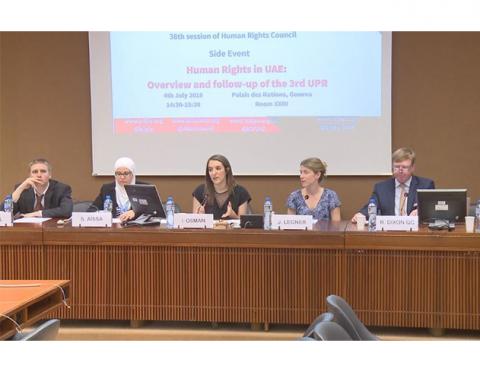
(Geneva – July 10, 2018) – On July 4, 2018, the Alkarama Foundation participated in a side event organised by the International Centre for Justice and Human Rights (ICJHR) during the 38th session of the UN Human Rights Council (HRC). The event consisted of an analysis of the recommendations noted and supported by the United Arab Emirates (UAE) as part of the adoption of its third Universal Periodic Review (UPR) outcome report.
Julia Legner – Regional Legal Officer for the Gulf at the Alkarama Foundation – raised her concern about the UAE’s UPR outcome, which she characterised as being marred by “controversies and contradictions”. Indeed, the UAE accepted only 57% of the recommendations made by UN Member States. What is more, these recommendations tended to be general rather than specific in nature. “While on the one hand, accepting such vague recommendations creates an image of engagement, it also makes it more difficult to assess whether they have been implemented during upcoming reviews,” she noted.
Similarly, ICJHR’s Executive Director, Safwa Aïssa, expressed her “perplexity” at the UAE government’s response to recommendations on human rights defenders. While the UAE accepted recommendations from France, Latvia and Norway to “ensure the protection of human rights defenders”, they rejected recommendations from Belgium, Italy and Austria to “[t]ake measures to prevent acts of harassment and intimidation of human rights defenders”. Aïssa added that the current situation in the UAE, in which human rights defenders continue to be arrested and unfairly sentenced, requires serious attention from the HRC.
Drewery Dyke of the Rights Realization Centre further questioned the UAE authorities’ commitment to upholding the rights of human rights defenders. He noted that the adoption of the state’s previous UPR in March 2013 coincided with the largest mass political trial in its history, known as the “UAE 94”. The 94 individuals convicted as part of this trial, including human rights defenders and their lawyers, were handed seven to ten year prison terms in unfair trials for allegedly wanting to “overthrow the regime”. As pointed out by Joe Odell – Press Officer for the International Campaign for Freedom in the UAE (ICFUAE) – the adoption of the state’s third UPR took place in a similar landscape, marked by the conviction of prominent human rights defender Ahmed Mansoor in May 2018. Mansoor was sentenced to ten years in prison for “defaming the UAE through social media channels” and “promoting sectarian hatred that would damage the UAE's social harmony and unity”.
Legner went on to note that despite ratifying the UN Convention against Torture (UNCAT) in 2012, the UAE only submitted its initial report in June 2018, five years after its due date. In addition, the state rejected basic recommendations on the issue in its UPR report, including ensuring impartial and independent investigations into all allegations of torture, as well as acceding to the Optional Protocol to the UNCAT, which provides for the establishment of a national preventive mechanism for torture.
Providing a practitioner’s perspective, UK Barrister Rodney Dixon QC of Temple Garden Chambers proposed the possibility of recourse to “universal jurisdiction” if there is indeed a lack of will to tackle human rights violations by the UAE authorities. Under this legal principle, a national court outside of the jurisdiction of the offending state may prosecute individuals for any serious crime, including torture, on the basis that it harms international order.
Looking ahead, Inès Osman – Coordinator of the Legal Department at the Alkarama Foundation – brought the event to a close by emphasising the importance of encouraging the UAE authorities to cooperate with UN mechanisms, given that this is currently one of the few avenues through which victims can seek remedies. With this in mind, the fact that the UAE has submitted its initial report to the UN Committee against Torture (CAT), means that civil society will be able to bring victim testimonies to the table during the review of the UAE by independent UN experts in summer 2019.
Source: Cartesius TV | Video Productions
For more information or an interview, please contact media@alkarama.org (Dir: +41 22 734 1006).
